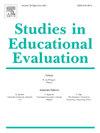命中目标?从用户角度看学校绩效指标的相关性和无关性
IF 2.6
2区 教育学
Q1 EDUCATION & EDUCATIONAL RESEARCH
引用次数: 0
摘要
许多教育系统实施标准化测试,以监测教育质量,并为学校提供成绩反馈。然而,影响用户是否以及如何使用这些反馈的关键特征之一是其感知相关性。本研究从情境的角度出发,对绩效指标的相关性进行了研究,从而对当前的研究现状进行了补充。通过 19 次深入访谈,本研究深入探讨了哪些反馈指标被视为相关或不相关,以及它们为何相关。研究结果表明,反馈相关性不仅取决于绩效反馈本身,还取决于用户对绩效反馈的理解以及用户的工作环境。因此,反馈设计者面临的挑战是如何整合这些不同的视角,以促进反馈的实际使用和学校的改进。本文章由计算机程序翻译,如有差异,请以英文原文为准。
Hitting the mark? A user perspective on the relevance and irrelevance of school performance indicators
Many educational systems implemented standardized tests to monitor educational quality and provide schools with performance feedback. However, one of the key characteristics that influence if and how users use such feedback is its perceived relevance. Adding to the current state of the art, this study brings in a situational perspective in the perceived relevance of performance indicators. By means of 19 in-depth interviews, this study provides insights into which feedback indicators are perceived as relevant or irrelevant and why they are. The results show that feedback relevance is not only determined by performance feedback as such, but also by the user that makes sense of it and the context in which users operate. Therefore, feedback designers face the challenge of integrating these different perspectives to facilitate actual feedback use and school improvement.
求助全文
通过发布文献求助,成功后即可免费获取论文全文。
去求助
来源期刊

Studies in Educational Evaluation
Multiple-
CiteScore
6.90
自引率
6.50%
发文量
90
审稿时长
62 days
期刊介绍:
Studies in Educational Evaluation publishes original reports of evaluation studies. Four types of articles are published by the journal: (a) Empirical evaluation studies representing evaluation practice in educational systems around the world; (b) Theoretical reflections and empirical studies related to issues involved in the evaluation of educational programs, educational institutions, educational personnel and student assessment; (c) Articles summarizing the state-of-the-art concerning specific topics in evaluation in general or in a particular country or group of countries; (d) Book reviews and brief abstracts of evaluation studies.
 求助内容:
求助内容: 应助结果提醒方式:
应助结果提醒方式:


